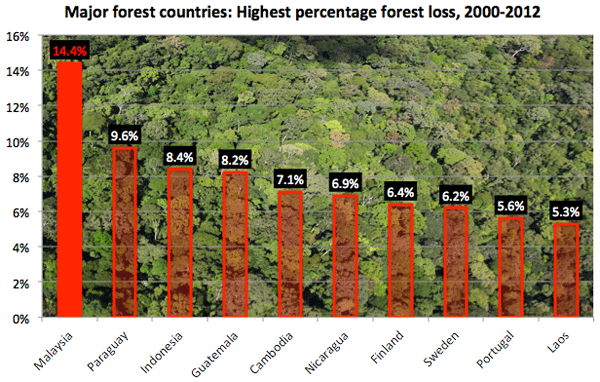- Malaysia had the world's highest rate of forest loss between 2000 and 2012, according to a new global forest map developed in partnership with Google.
- The map for Malaysia's deforestation shows that the most intense clearing activities took place in the states of Kelantan, Terengganu, Pahang and Johor, while there are also many red areas appearing in the long coastal areas from Sibu to Miri in Sarawak.
In Only 12 Years, The Area Of The Forest Lost In Malaysia Is Larger Than The Surface Area Of Denmark
- Malaysia's total forest loss during the period amounted to 14.4 percent of its year 2000 forest cover. The loss translates to 47,278 square kilometers (18,244 square miles), an area larger than Denmark.
- The findings of the mapping - which documents forest loss and gain between 2000 and 2012 based 650,000 satellite images - was carried out by a team from University of Maryland and was published in a science journal, reported international broadcaster BBC.
During The Same Period, Malaysia's Oil Palm Plantations Grew By Approximately 50%
This Was After Years Of Unsustainable Logging For Timber Stocks
The Deforestation Rate In Malaysia Is A Stagerring 50% Higher Than The Next Runner Up, Paraguay
- Malaysia's rate of forest loss during the period was nearly 50 percent higher than the next runner up, Paraguay (9.6 percent). Its area of forest loss ranked ninth after Russia, Brazil, the United States, Canada, Indonesia, China, the Democratic Republic of Congo, and Australia. Malaysia's net forest loss — 21,480 sq km — ranked 12th globally.
These Were The Same Dense Forests That Housed Endangered Native Species Such As Orangutan, Rhinoceros, Elephants And More
While Some Forests Have Been Replanted Over The Years, The New Trees Are No Where As Dense Nor Valuable As They Were
- Dan Zarin, program director of the Climate and Land Use Alliance, an association of philanthropic foundations, says trading natural forests for planted forests represents a net loss for the planet. “You can't ‘net out’ deforestation by planting trees," said Zarin, "because newly planted forests are far less valuable for carbon, biodiversity and forest-dependent people than standing native forests.”
- Offsetting the loss in forests was a 25,978 sq km gain in vegetation cover resulting from natural recovery, reforestation and establishment of industrial timber and oil palm plantations. The report noted that the oil palm industry was a powerful political force in the country.
















4 comments:
This post is really helpful! thanks
Need more people know about this..
Need more people know about this..
Im so sad...as a malaysian, i love my land because of the rainforests that has been inherited since Allah created the world. Not because of the business money making minded people for themselves buying up lands, conquering up lands and to chase development that they think money can make them survive!! not to mention malaysians are slaves of western white people life, take their lifestyle and culture as and example for their guidance of life. Sickenly sad!
Post a Comment